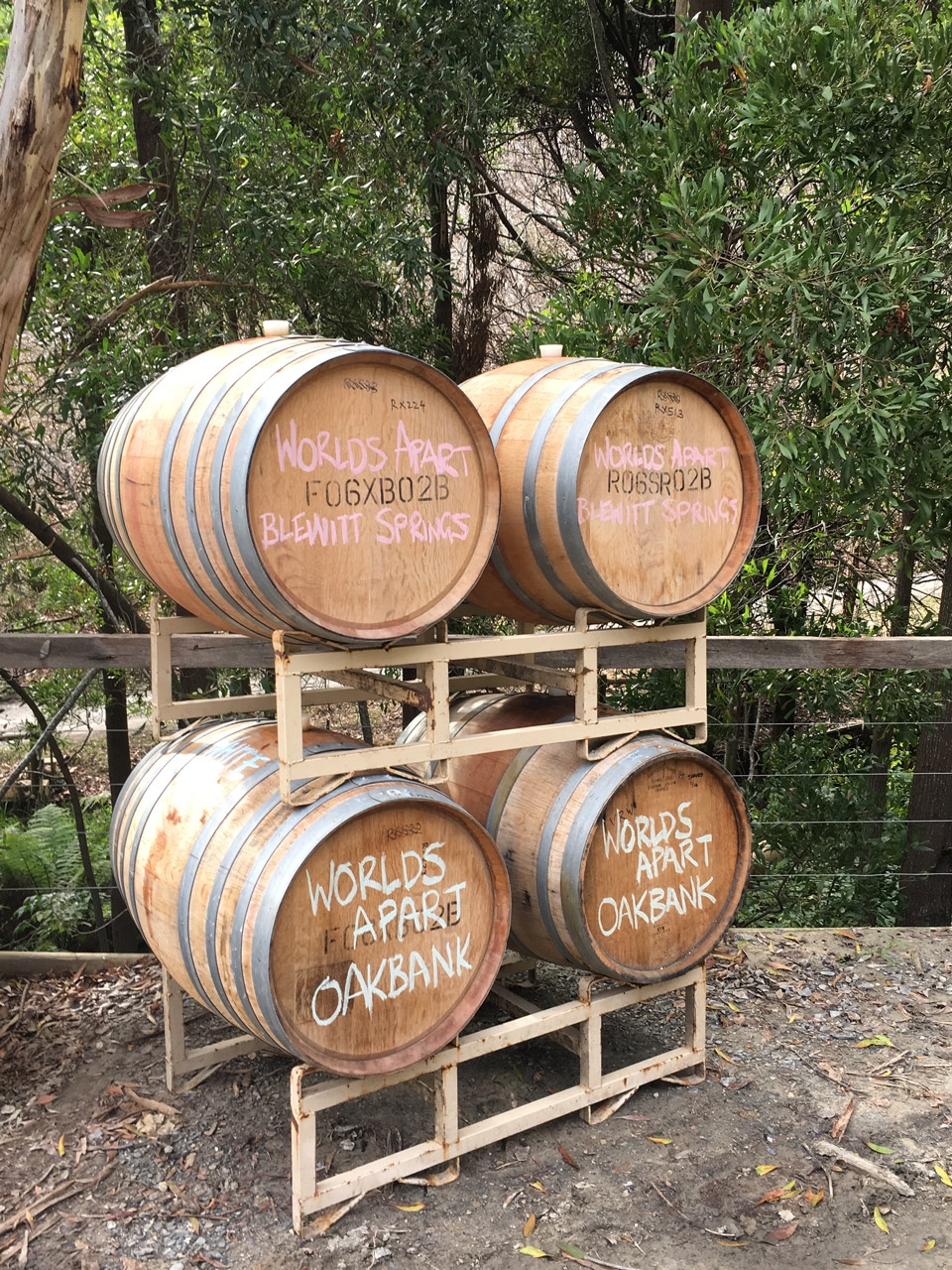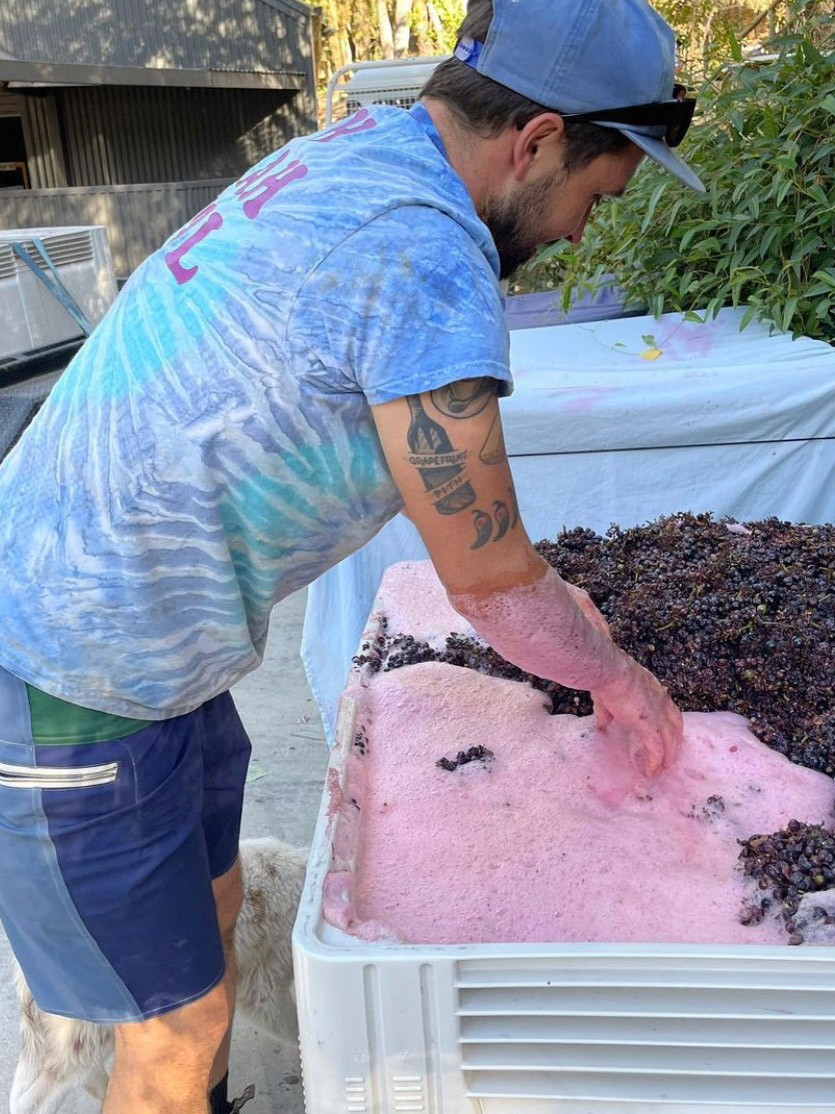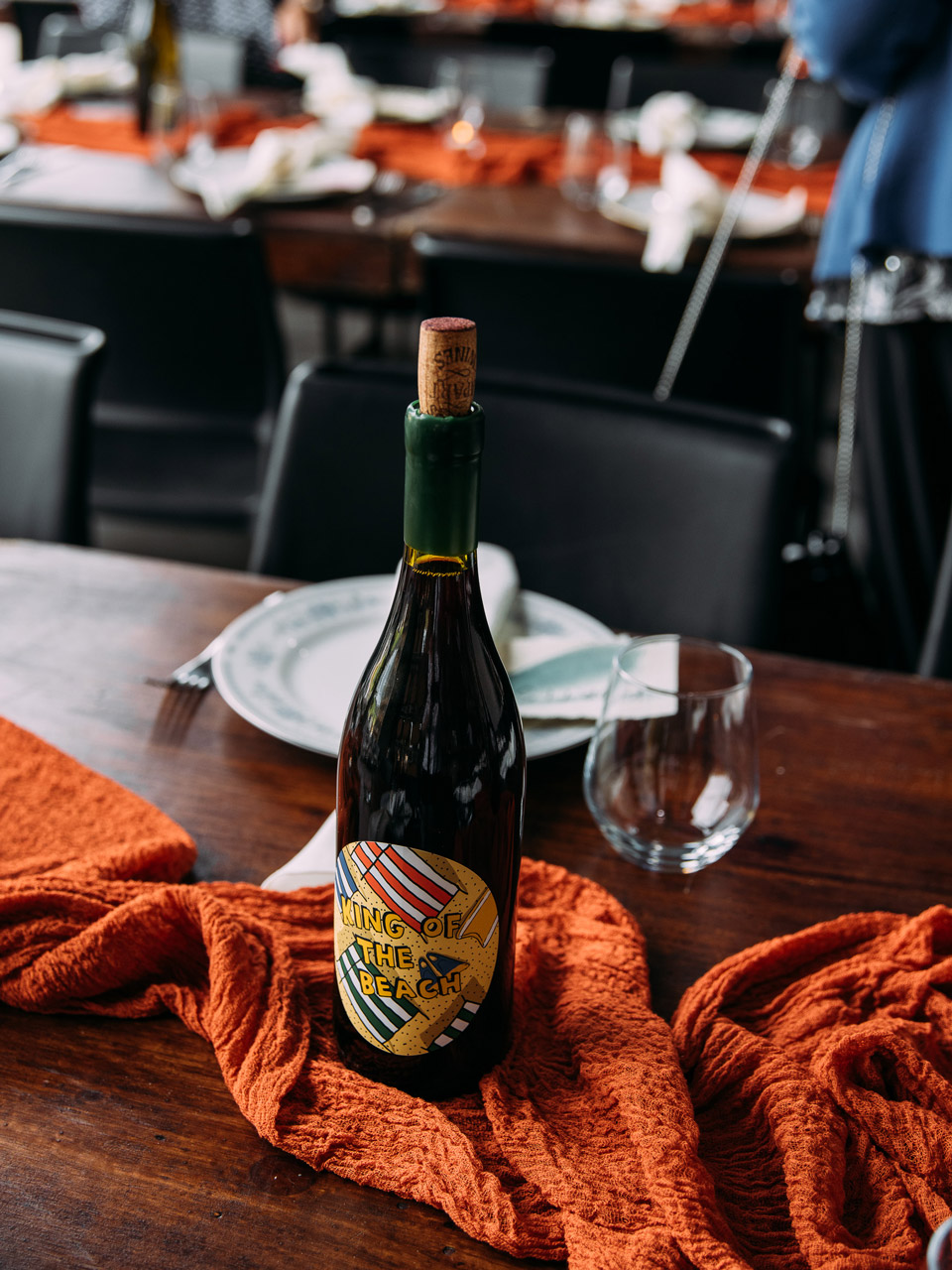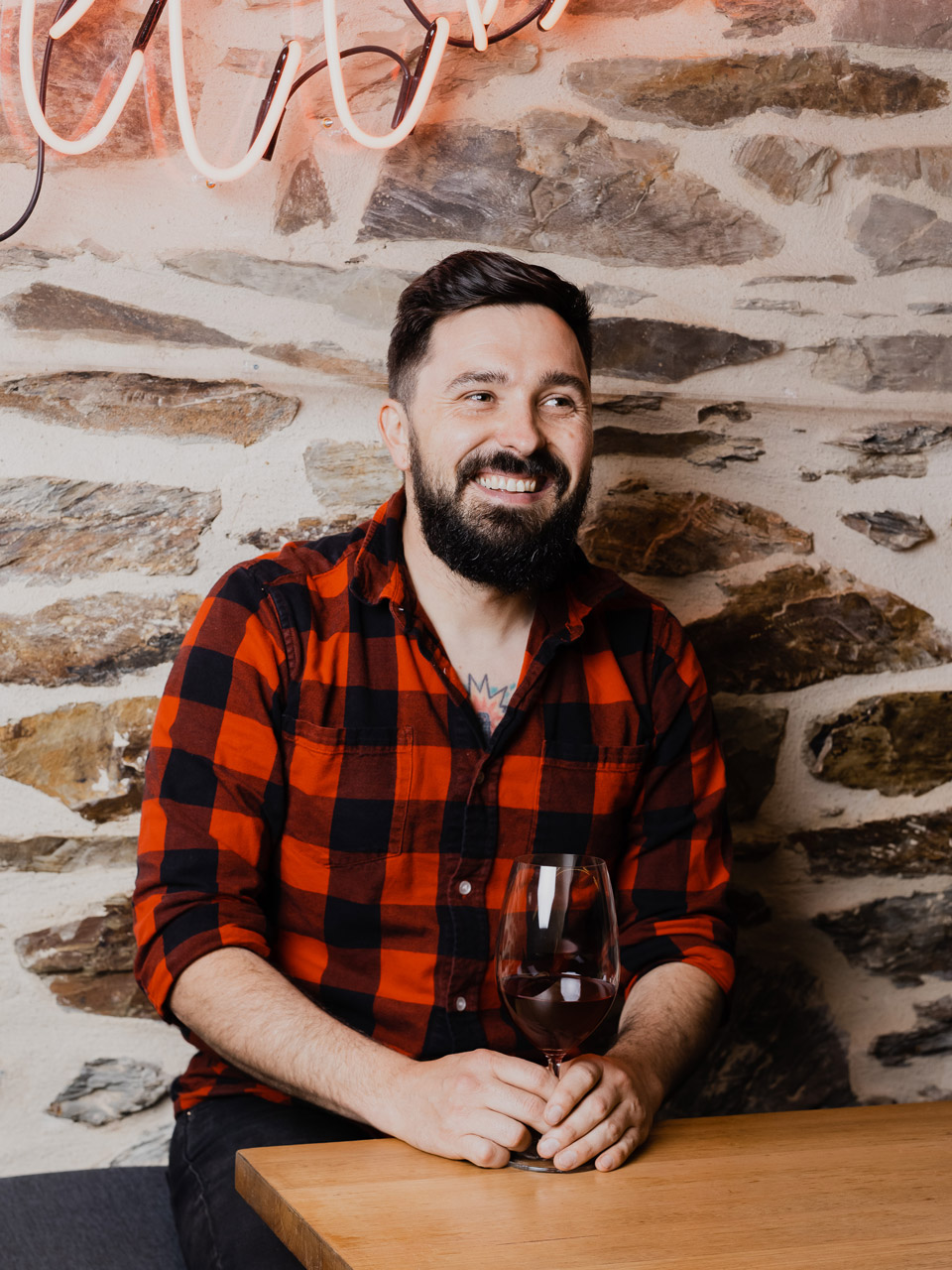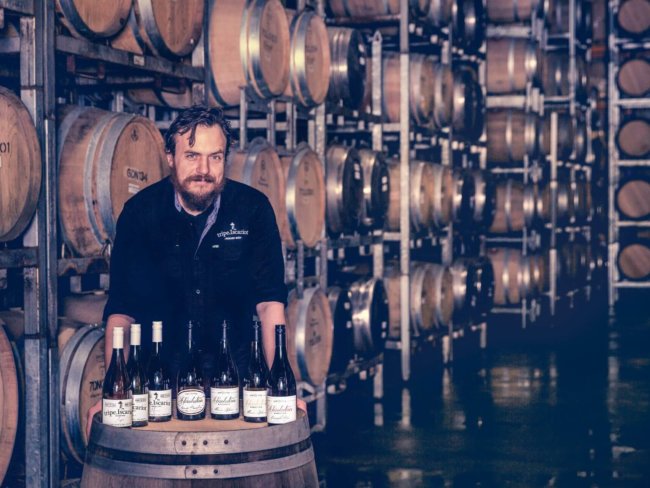With wines that are light to medium in weight, and sensitive making that sticks to minimal sulphur doses as the only additive, Louis Schofield launched Worlds Apart Wines in 2017. He works with syrah, riesling, grenache, nero d’avola, pinot noir, chardonnay, gamay and sauvignon blanc, sourced from McLaren Vale, the Eden Valley, and his home in the Adelaide Hills. And while his wines trace a natural arc, Schofield has no interest in dogma, with drinkability taking centre stage.
“We’re trying to draw on what we believe are the best aspects of natural wine and classic winemaking to make wines that are pure, energetic and truthful to place and variety, but, most importantly, are delicious,” says Schofield. “We have grown substantially over the last couple of years, but we will stick to the plan of the right varieties in the right place, grown close to our home in the Hills.”
Schofield, like many before him, crossed over from hospitality to become a winemaker, though he hasn’t left his earlier profession behind, either, co-owning and running Adelaide’s hugely loved and delightfully iconoclastic Hellbound wine bar. Prior to that, Schofield worked for six years at the legendary East End Cellars in fine wine retail, and he was also a sommelier at Jock Zonfrillo’s lauded Orana.
Since 2016, he has worked as assistant winemaker at Ochota Barrels, as well as at the wood-fired wine lounge that served as the Ochota Barrels cellar door, but perhaps even more critically as a Basket Range community hub. He has also worked a vintage in Arizona with Tool’s Maynard Keenan – who Taras Ochota famously collaborated with – before launching Worlds Apart Wines in 2017.
“We make wines that are delicious,” says Schofield. “After a long time working in fine wine retail and in restaurants, I think I’ve drawn on a diverse range of influences, from natural wine in Basket Range, to great Burgundies, to tiny cult producers from all over Australia and Europe. I have tasted a lot of great wine from all over the world and I aspire to make wine thoughtfully, with the principal motivation being that people love drinking it.”
Although Schofield’s path seems a logical one, making wine was never his intention. “I always said I’d never make my own wine: ‘There are enough people making shitty wine without me doing it too.’ But it was really Taras [Ochota] that gave me the confidence to have a crack. And for the first couple of years, I made bugger all, just sold it to friend’s bars and restaurants and bottle shops, but in 2020 we thought we could make a little bit more, and it went super well.”
Sourcing fruit from vineyards in three regions, Schofield describes his wines as “light to medium bodied, naturally made, with great attention to detail, from exceptional vineyards and growers around the cooler parts of South Australia – drinkability, quality and complexity are the goals. We take fruit from vineyards in three wine regions that are all within an hour’s drive of us. Eden Valley for syrah and riesling, McLaren Vale for grenache and nero d’avola, and pinot, chardonnay and sauvignon from the Adelaide Hills. My experience has given me an idea of what varieties I think work well in which areas. Also, it means we have some resilience against things like bushfires, not having all our eggs in one basket.”
On his home property in the Adelaide Hills, Schofield is making a home for the brand.in the process of building “an almost off-grid winery” “We are in the design stage of building a semi-underground, off-grid, sustainable, small winery at our house in the Adelaide Hills,” he says, noting it that he says will also have efficiencies built in to manage water use, with the site only serviced by rainwater. That home in the Hills is an important one for other reasons, too, with Schofield crediting the dynamic and cooperative nature of the wine community there as being pivotal to the strength of the region’s wines.
“There is a brilliant collaborative and competitive culture amongst small wineries in our community, and the benefits of that are seen in the glass. It’s pretty amazing to taste barrels and talk openly about your friend’s wines and vice versa. As a fledgling winemaker without formal training, leaning on more experienced people has been invaluable for me. I learned how to make wine in Taras Ochota’s shed, after learning how to sell, and drink, wine at East End Cellars. I don’t think I could have asked for better mentors.”
Schofield is determined to not get “caught up in what’s cool or weird or currently on trend,” rather focusing on wines that people want to drink. “We definitely aren’t trying to reshape perceptions of wine, we’re trying to draw on the best parts of ‘natural wine’ and whatever it is you call the other kind of wine, to make wine that is pure, vibrant, speaks of place and variety but most importantly is yum. We are, of course, focused on sustainable grape growing – mainly cos it’s better fruit.”
With the 2020 release, the Worlds Apart Wines’ range expanded both in offerings and volume, but with good notices from the likes of Messrs Stock and Bennie, and an already loyal following, those wines sold out rapidly. That saw an increase in production for both the 2021 and 2022 releases, but Schofield doesn’t see the label expanding any further.
“We have grown pretty close to the scale of production we would like to get to,” he says, noting that the artisan production principles and prime fruit sources are something he would never compromise on.
“In 2020All all the wines were are un-fined, and all were unfiltered, with around 30ppm sulphur,” says Schofield, “with the exception of the riesling, that was filtered cos it had a couple of grams of sugar, and had a little more sulphur because I think riesling has a great affinity for it. . We fermented everything in old oak. All fruit was is grown without any certification but from exceptionally thoughtful and hardworking growers who don’t use synthetic shit in their vineyards.”

